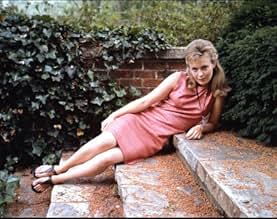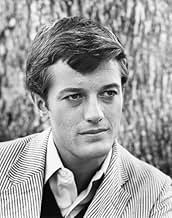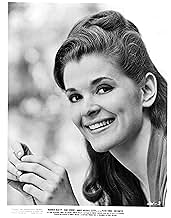IMDb RATING
6.8/10
3.4K
YOUR RATING
A war veteran gets work at a mental institution, where he meets the beautiful and eccentric Lilith.A war veteran gets work at a mental institution, where he meets the beautiful and eccentric Lilith.A war veteran gets work at a mental institution, where he meets the beautiful and eccentric Lilith.
- Director
- Writers
- Stars
- Awards
- 2 nominations total
Walter Arnold
- Lonely Girl's Father
- (uncredited)
Rene Auberjonois
- Howie
- (uncredited)
Elizabeth Bader
- Girl at Bar
- (uncredited)
Ruth Baker
- Patient
- (uncredited)
Janet Banzet
- Patient
- (uncredited)
Amelie Barleon
- Patient
- (uncredited)
Carson Barnes
- Child Crossing Street
- (uncredited)
Jeanne Barr
- Miss Glassman
- (uncredited)
David Barry
- Ambulance Attendant
- (uncredited)
- Director
- Writers
- All cast & crew
- Production, box office & more at IMDbPro
Featured reviews
This forgotten, totally under-appreciated film from 1964 is very powerful (I believe it was Robert Rossen's last film). Strangely hypnotic and frightening in a very subtle way, this showed Beatty three years before B&C showing the potential he had in Splendor in the Grass. He also met Gene Hackman while making this and later cast him as his brother in B&C which launched Hackman.
There is also a splendid performance from Peter Fonda, of all people. As Hackman's wife, Jessica Walter showed how amazing she was at a relatively young age and just never got the right parts in decent films. You'll also see a young Rene Auberjenois and Olympia Dukakis in a bit part. I hope more people look into this devastating piece on mental illness.
There is also a splendid performance from Peter Fonda, of all people. As Hackman's wife, Jessica Walter showed how amazing she was at a relatively young age and just never got the right parts in decent films. You'll also see a young Rene Auberjenois and Olympia Dukakis in a bit part. I hope more people look into this devastating piece on mental illness.
Robert Rossen would only direct ten films in the space of 17 years and, despite their sometimes erratic quality, he was a talented and highly respected figure. His neglected and misunderstood swan-song was deemed by some a means of reparation for his former Communist beliefs and the fact that he was a friendly witness during the HUAC hearings (the confused hero wanting to make good but ending up disillusioned); when the picture was mauled by critics, he got cold feet and bailed out of his intention to present it at the Venice Film Festival!
Few American movies up to this point had revolved around insane asylums, most notably the prestigious THE SNAKE PIT (1948), Vincente Minnelli's glossy, all-star melodrama THE COBWEB (1955) and the somewhat hysterical SHOCK CORRIDOR (1963) from maverick film-maker Samuel Fuller. Still, this is more of a character study than a serious treatment of its subject matter (which, outside of the inmates played by Jean Seberg and Peter Fonda – a nice early dramatic showcase for the latter – are restricted to a handful of intense irrational outbursts, for lack of a better phrase). Even so, Warren Beatty’s brooding occupational therapist protagonist is himself often impenetrable (despite the sympathetic guidance of asylum head Kim Hunter) – justifying his own breakdown at the film’s abrupt, haunting conclusion. The essential gloominess of the piece is, however, offset by passages of lyricism (the ethereal yet experimental black-and-white cinematography by veteran Eugen Schuftan – who had won as Oscar for Rossen’s previous film, THE HUSTLER [1961] – is exquisite throughout): that said, sequences such as the lengthy interlude at the fair (complete with an archaic jousting tournament) seem to be making some obscure point or other which renders it a slightly pretentious whole.
Apart from the fact that therapist and patient are involved in a tempestuous love affair, the film’s controversial aspects entail scenes subtly depicting paedophelia, a lesbian relationship and also the temptation for an extra-marital fling by Beatty’s former girlfriend (Jessica Walter); a young Gene Hackman appears as Walter’s workaholic but uncouth husband in one scene – naturally, he would re-unite with Beatty for Arthur Penn’s seminal BONNIE AND CLYDE (1967). Despite his classic good looks, Beatty didn’t conform to Hollywood standards – opting from the outset for gritty and often demanding fare (including John Frankenheimer’s ALL FALL DOWN [1962] and Penn’s MICKEY ONE [1965]) whenever he could. The beguiling Seberg exudes effortless sensuality in the role of the enigmatic Lilith which, reportedly, was her own personal favorite; chillingly, the climactic regression into total madness of her character parallels that of the actress herself who would eventually take her own life 15 years later!
Few American movies up to this point had revolved around insane asylums, most notably the prestigious THE SNAKE PIT (1948), Vincente Minnelli's glossy, all-star melodrama THE COBWEB (1955) and the somewhat hysterical SHOCK CORRIDOR (1963) from maverick film-maker Samuel Fuller. Still, this is more of a character study than a serious treatment of its subject matter (which, outside of the inmates played by Jean Seberg and Peter Fonda – a nice early dramatic showcase for the latter – are restricted to a handful of intense irrational outbursts, for lack of a better phrase). Even so, Warren Beatty’s brooding occupational therapist protagonist is himself often impenetrable (despite the sympathetic guidance of asylum head Kim Hunter) – justifying his own breakdown at the film’s abrupt, haunting conclusion. The essential gloominess of the piece is, however, offset by passages of lyricism (the ethereal yet experimental black-and-white cinematography by veteran Eugen Schuftan – who had won as Oscar for Rossen’s previous film, THE HUSTLER [1961] – is exquisite throughout): that said, sequences such as the lengthy interlude at the fair (complete with an archaic jousting tournament) seem to be making some obscure point or other which renders it a slightly pretentious whole.
Apart from the fact that therapist and patient are involved in a tempestuous love affair, the film’s controversial aspects entail scenes subtly depicting paedophelia, a lesbian relationship and also the temptation for an extra-marital fling by Beatty’s former girlfriend (Jessica Walter); a young Gene Hackman appears as Walter’s workaholic but uncouth husband in one scene – naturally, he would re-unite with Beatty for Arthur Penn’s seminal BONNIE AND CLYDE (1967). Despite his classic good looks, Beatty didn’t conform to Hollywood standards – opting from the outset for gritty and often demanding fare (including John Frankenheimer’s ALL FALL DOWN [1962] and Penn’s MICKEY ONE [1965]) whenever he could. The beguiling Seberg exudes effortless sensuality in the role of the enigmatic Lilith which, reportedly, was her own personal favorite; chillingly, the climactic regression into total madness of her character parallels that of the actress herself who would eventually take her own life 15 years later!
Jean Seberg is absolutely captivating in this film. Yes despite the wig she wears, due to the fact her hair was cropped short for her previous films, she is as lovely as ever. One of my favorite films of all time and certainly the best one that deals with insanity in and honest and true way, not only avoiding the cliché' but completely reversing it and debunking the stereotype. Robert Rossen is a great director, one of history's most under-appreciated and few others could helm this story the way he does. Based on the novel by J.R. Salamanca, the story is of a young war vetern who returns home and seeks a job at the local mental institute. There he gets too involved with several of the patients and learns much about their past, which reflects the tragedy in his own life involving his mother.
It's true Warren Beatty does play the role blandly and stiff. While that's a turn off for many people watching the film, I think they fail to understand that just like Ryan O'Neil in Barry Lyndon, it's the character they're playing. Not the actor and certainly not the direction. Wonderful supporting cast from Kim Hunter and Peter Fonda as well as a brilliant cameo by Gene Hackman, which oozes of a marriage gone sour in his bit part.
It's a very hard film to figure out because so much is left untold and rightfully so leaving the audience to decide what happened. Playing on the fable of the past coming back to haunt us it plays deeply on buried memories and traumatic life experiences that were covered up rather than confronted. There is so much positive to say about this amazing film, but even so it's actress Jean Seberg that is the crown jewell in this picture. Criminally underseen, now that it is on DVD anyone interested in deep character studies should make it a point to watch this ASAP.
It's true Warren Beatty does play the role blandly and stiff. While that's a turn off for many people watching the film, I think they fail to understand that just like Ryan O'Neil in Barry Lyndon, it's the character they're playing. Not the actor and certainly not the direction. Wonderful supporting cast from Kim Hunter and Peter Fonda as well as a brilliant cameo by Gene Hackman, which oozes of a marriage gone sour in his bit part.
It's a very hard film to figure out because so much is left untold and rightfully so leaving the audience to decide what happened. Playing on the fable of the past coming back to haunt us it plays deeply on buried memories and traumatic life experiences that were covered up rather than confronted. There is so much positive to say about this amazing film, but even so it's actress Jean Seberg that is the crown jewell in this picture. Criminally underseen, now that it is on DVD anyone interested in deep character studies should make it a point to watch this ASAP.
This film was referred to me by a classmate at the U.S. Navy school I was attending in mid-1965. I was a naive young sailor who invariably felt like I didn't fit in. I had felt very connected with James Dean, specifically in REBEL WITHOUT a CAUSE -- talk about a misunderstood young man! Being a bit disturbed seemed to work with both James and myself when attracting kind-hearted and trusting young women.
That being said, and having no idea what the movie was about, I paid my dime (at the base theater), entered, visited the snack bar and proceeded to have my whole world altered. Warren Beatty a kindred spirit -- honest, compassionate, trusting and vulnerable, with a few secrets of his own best kept buried deep within. Jean Seaberg was a vision of desire, sensuality, and intrigue, with more than enough dark secrets herself to draw me and Warren into her world like the largest, strongest magnet on Earth. Before long the co-stars were as one in Lilith's playground. I quickly followed eagerly -- her world looked far better than any I had ever seen or imagined. I was lead on a fabulous, ALICE IN WONDERLAND journey where, while much was familiar, I wasn't at all sure which way was up.
As the movie ended I still had no sense of direction. Hoping to gain greater understanding of where I had ended up and how to return to the "real" world, although I was not entirely sure I wanted to, I exited the theater, paid another dime and returned to my still-warm seat.
No answer was forthcoming -- only more questions, as I re-entered Lilith's wonderland. I think I have never left, nor do I have even the slightest desire to.
That being said, and having no idea what the movie was about, I paid my dime (at the base theater), entered, visited the snack bar and proceeded to have my whole world altered. Warren Beatty a kindred spirit -- honest, compassionate, trusting and vulnerable, with a few secrets of his own best kept buried deep within. Jean Seaberg was a vision of desire, sensuality, and intrigue, with more than enough dark secrets herself to draw me and Warren into her world like the largest, strongest magnet on Earth. Before long the co-stars were as one in Lilith's playground. I quickly followed eagerly -- her world looked far better than any I had ever seen or imagined. I was lead on a fabulous, ALICE IN WONDERLAND journey where, while much was familiar, I wasn't at all sure which way was up.
As the movie ended I still had no sense of direction. Hoping to gain greater understanding of where I had ended up and how to return to the "real" world, although I was not entirely sure I wanted to, I exited the theater, paid another dime and returned to my still-warm seat.
No answer was forthcoming -- only more questions, as I re-entered Lilith's wonderland. I think I have never left, nor do I have even the slightest desire to.
10sabalo
This is one of those films that managed to leave an enduring impression on me and I've seen it quite a few times since finding it quite by chance. It reminds me of that other great unknown the Ninth Configuration. It tells the story of a troubled ex soldier who goes to work at an asylum and quite unexpectedly loses himself in the world of one of the patients - Lilith. Jean Seberg is quite simply out of this world, her every gaze and expression drawing you the viewer in. It's easy to see how both Vincent and another patient Stephen, an introverted young man, are irresistibly attracted to her visions of ecstatic escapism from the unhappy 'real' world outside. Unlike what it says the back of the case, which rather glorifies the trouble she causes and implies a scheming manipulator of men's emotions this is essentially a poetic tale (of course that doesn't sell!). Instead I was left feeling the problems were all caused by others' reaction to her and the neurosis locked up in all of us that she has a talent for bringing out, and healing if they'd but let go of their insecurities. As a man, it left me struggling with both Vincent and Stephens actions as I can see a part of me in both of them. It also left me wishing I was in the story and how I'd do things differently from them. That's the powerful effect of this film. Also worth noting is the connection, never explicitly stated, with the legends of Lilith and the fall of Adam. In this sense you get to hear her side of the story.. quite remarkable
Did you know
- TriviaAccording to Kim Hunter: "The tensions on the set contributed to his [Rossen's] death. I don't think I want to talk about it. Since then, Warren has grown so; at that time, he wasn't ready to be a star. He knew it and was scared! In rehearsal, he'd be great. The closer he got to the camera, the more he'd retreat. He'd cut half his lines, which made Warren interesting and the rest of us talky as hell! He gave Jean no help whatsoever. She was damn good in a demanding role. At the wrap party, a group of people threw Warren into a stream".
- GoofsWhen the staff and patients are loading up to go on their picnic, two of the cars are 1955 Cadillac Fleetwood 75's. When they arrive at their destination, the cars have changed into 1958 and 1959 Cadillac Fleetwood 75's. The station wagon has changed from a 1959 Ford Country Squire to a 1960 Ford Country Squire.
- Quotes
Lilith Arthur: If you should discover that your god loved others as much as he loved you, would you hate him for it?
- ConnectionsFeatured in From the Journals of Jean Seberg (1995)
- How long is Lilith?Powered by Alexa
Details
- Release date
- Country of origin
- Language
- Also known as
- Robert Rossen's Lilith
- Filming locations
- Great Falls, Virginia, USA(picnic scenes)
- Production companies
- See more company credits at IMDbPro
Box office
- Gross worldwide
- $542
- Runtime1 hour 54 minutes
- Color
- Aspect ratio
- 1.85 : 1
Contribute to this page
Suggest an edit or add missing content



































